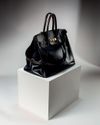Double Take

When you think about it, all art that attempts to represent the three-dimensional world on a two-dimensional surface - be it a wall, a canvas, a board, a piece of paper or a stretch of sidewalk - is an illusion. The artist uses certain systems and techniques to create the impression of space, depth and movement, and the better their skills are the more we, the viewer, believe in the reality of these worlds.
Interestingly, before the 14th century western artists made little attempt to realistically depict a three-dimensional world, which is why the art of the Byzantine, Medieval and Gothic periods seem so odd to the modern viewer. Creating the illusion of depth and space was not the priority back then. Chinese art of this time - on the other hand tended to merely "suggest" recession across space with careful fades and blurs.
By the 13th century, painters in Italy such as Giotto and Duccio began using heavy shadowing to give the illusion of depth and volume in their art, and thus an early form of perspective was born. The first known use of true linear perspective in Western art, however, is generally credited to the Florentine architect Fillipo Brunelleshi, who in 1415 depicted the Baptistery in Florence from the front gate using "vanishing points" - in which all lines converge, at eye level, on the horizon.
Brunelleshi's painting essentially introduced a wholly new concept, and many Italian artists started to use linear perspective soon afterwards.
By the late 15th century, European artists had mastered linear perspective and were able to create strikingly realistic worlds. Of course, as soon as this effect became widespread, artists also started playing with it, and Andrea Mantegna's famous Oculus of the Bridal Chamber, in the Ducal Palace of Mantua (1465-1474), attempts to make it seem as though a host cherubs and other figures are staring down at one from an open window in the ceiling.
This story is from the September 2024 edition of Prestige Singapore.
Start your 7-day Magzter GOLD free trial to access thousands of curated premium stories, and 9,000+ magazines and newspapers.
Already a subscriber ? Sign In
This story is from the September 2024 edition of Prestige Singapore.
Start your 7-day Magzter GOLD free trial to access thousands of curated premium stories, and 9,000+ magazines and newspapers.
Already a subscriber? Sign In

EMBERS IN THE CITY
Offering a richer, more inclusive approach, National Gallery Singapore's new landmark exhibition is set to reshape how we understand Parisian art history and the role of Asian artists within it, presenting them not just as figures on the periphery of European modernism, but as central to its development.

NOT SO PLAIN JANE
For all the reverence the fashion world has for the Birkin bag today, the woman for whom it was named — and the owner of the original stylish carry-all — was one hell of a tomboy who really roughed hers up.

Chanel's Sporting Chance
Still an amateur event and contested since 1829, The Boat Race, which takes place each spring on the River Thames between the dark and light blues of Oxford and Cambridge universities respectively, is Britain's oldest major sporting occasion.

REFRESH, UNFURL
Van Cleef & Arpels' Lucky Spring collection celebrates the arrival of a new season with ladybird, plum blossom and lily-of-the-valley motifs.

Colourful Expressions
With its high jewellery collection, Les Formes de La Couleur, Hermès embarks on an exploration of the shapes of colour.

LOVE STORY
Your tale of everlasting romance begins with a Harry Winston engagement ring.

REBEL MOON
Few watches have captured the public imagination quite like the MoonSwatch. With sold-out releases, long queues, and skyrocketing demand, this result of an unexpected partnership between Omega and Swatch has redefined what a watch collaboration can be.

SEDUCTION BY ANALOGUE
In an era of electrification and digitalisation, Pagani's new Utopia defies convention with its exquisite craftsmanship and a purist's approach to driving.

PHUKET'S MILLIONAIRE'S MILE
Phuket’s most luxurious villa rentals, priciest real estate, and best ocean views can be found on a small stretch along the island's west coast. Prestige explores southern Thailand’s wealthiest neighbourhood, where utmost luxury is made manifest.

A BIG BANG
With its bold timepieces and ad campaigns, Hublot has never been boring. Its new CEO, JULIEN TORNARE, thinks it can go a lot further.
